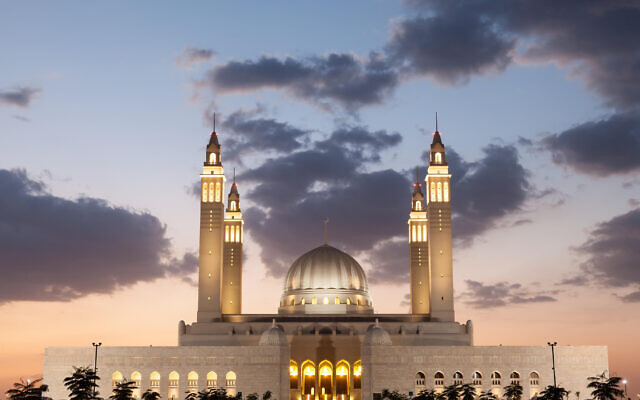Oman, once thought to be next Abraham Accords signer, criminalises relations with Israel
The sultanate at the southern tip of the Arabian Peninsula was for a long time closer with Israel than other states in the region were.
Just a few years ago, Oman was expected to be next in line after Morocco, Sudan, Bahrain and the United Arab Emirates to sign onto the Abraham Accords normalisation agreements with Israel.
On Friday, the country’s parliament voted to criminalise any relations or interactions with “the Zionist entity.”
While the exact details have not been made public, the new law seems to be broadly applied.
“The brothers, Your Excellencies, looked at the development taking place, whether it was technical, cultural, economic or sports, and proposed additional amendments that include severing any economic, sports or cultural relations and prohibiting dealing in any way or means, whether it was a real meeting, an electronic meeting or something else,” said Yaqoub Al-Harithi, vice president of the Omani parliament, about the bill, according to Oman’s WAF news agency.
The sultanate at the southern tip of the Arabian Peninsula, where the Indian Ocean meets the Persian Gulf, was for a long time closer with Israel than other states in the region were. Oman never took part in any war with the Jewish state and established unofficial trade relations with Israel in the early 2000s.
Omani Sultan Qaboos Bin Said welcomed three Israeli prime ministers to his country: Yitzhak Rabin in 1994, Shimon Peres in 1996 and Benjamin Netanyahu in 2018. Rabin’s visit was the first by an Israeli prime minister to a Gulf nation.
Under Qaboos’ leadership, Oman carved a niche for itself as the Switzerland of the Middle East, able to deal simultaneously with countries such as Israel, Iran, Saudi Arabia, Qatar and Yemen, all while maintaining a sense of neutrality. The country has been an important middleman in everything from the Iranian nuclear talks to Yemeni Civil War negotiations.
So what happened?
Sultan Qaboos, who was the longest reigning ruler of the Middle East’s oldest independent state, died in 2020 with no heirs. Rulership passed to his cousin Haitham Bin Tariq.
Though Sultan Haitham, upon his inauguration, announced that he would follow in his predecessor’s peace-making footsteps, he has moved closer to Iran, which funds military activity throughout the region.
While Saudi Arabia opened its airspace for Israeli flights earlier this year, Oman has held out on opening its own, blocking the most direct route for some flights from Israel to Asia. In doing so, Oman has received pressure from President Joe Biden’s administration to open its skies.
However, the developments Al-Harithi is referring to in his statement could include the rise of Israel’s new right-wing government, which has already provoked anger well beyond the Middle East.
“What also potentially fuels this is a recent call by a number of Arab countries, including the UAE, to go to the United Nations and condemn Israel over the recent rise of [Itamar] Ben-Gvir,” Nir Boms, the director of the Program for Regional Cooperation at the Moshe Dayan Center of Tel Aviv University told the Jewish Telegraphic Agency.
Protesting Israel “remains one of the few unifying factors in the Arab world,” Boms said.
For more Islamist-leaning factions across the region, “The issues around Israel are coming to a point where they need to have a counter-reaction and come back to a boycott policy,” he added.
Another reason may be fear of Iran, which is conducting military exercises off of Oman’s coast and is reeling from months of domestic protest.
“The last thing Muscat wants is for the Gulf to become a battlefield with attacks on western shipping, resulting in the closure of the Straits of Hormuz,” said Tom Gross, a British journalist and Middle East expert.
“Oman, like Qatar, is trying to calm Iran. Their message is: ‘We are not the ones rushing to form relations with Israel so don’t take it out on us.’”
Despite the bill, Gross thinks that Omani relations with Israel will continue as they always have, under the table.
“The Omani vote was primarily designed to appease the Iranian regime. There is a feeling in intelligence circles that the counter-revolutionary uprising in Iran has passed the point of no return and as a result the regime in Tehran may try to externalize its domestic problems,” Gross said.
“Meanwhile, relations with Israel will likely continue, albeit more quietly.”

Thank you for helping to make Jewish News the leading source of news and opinion for the UK Jewish community. Today we're asking for your invaluable help to continue putting our community first in everything we do.
For as little as £5 a month you can help sustain the vital work we do in celebrating and standing up for Jewish life in Britain.
Jewish News holds our community together and keeps us connected. Like a synagogue, it’s where people turn to feel part of something bigger. It also proudly shows the rest of Britain the vibrancy and rich culture of modern Jewish life.
You can make a quick and easy one-off or monthly contribution of £5, £10, £20 or any other sum you’re comfortable with.
100% of your donation will help us continue celebrating our community, in all its dynamic diversity...
Engaging
Being a community platform means so much more than producing a newspaper and website. One of our proudest roles is media partnering with our invaluable charities to amplify the outstanding work they do to help us all.
Celebrating
There’s no shortage of oys in the world but Jewish News takes every opportunity to celebrate the joys too, through projects like Night of Heroes, 40 Under 40 and other compelling countdowns that make the community kvell with pride.
Pioneering
In the first collaboration between media outlets from different faiths, Jewish News worked with British Muslim TV and Church Times to produce a list of young activists leading the way on interfaith understanding.
Campaigning
Royal Mail issued a stamp honouring Holocaust hero Sir Nicholas Winton after a Jewish News campaign attracted more than 100,000 backers. Jewish Newsalso produces special editions of the paper highlighting pressing issues including mental health and Holocaust remembrance.
Easy access
In an age when news is readily accessible, Jewish News provides high-quality content free online and offline, removing any financial barriers to connecting people.
Voice of our community to wider society
The Jewish News team regularly appears on TV, radio and on the pages of the national press to comment on stories about the Jewish community. Easy access to the paper on the streets of London also means Jewish News provides an invaluable window into the community for the country at large.
We hope you agree all this is worth preserving.






















